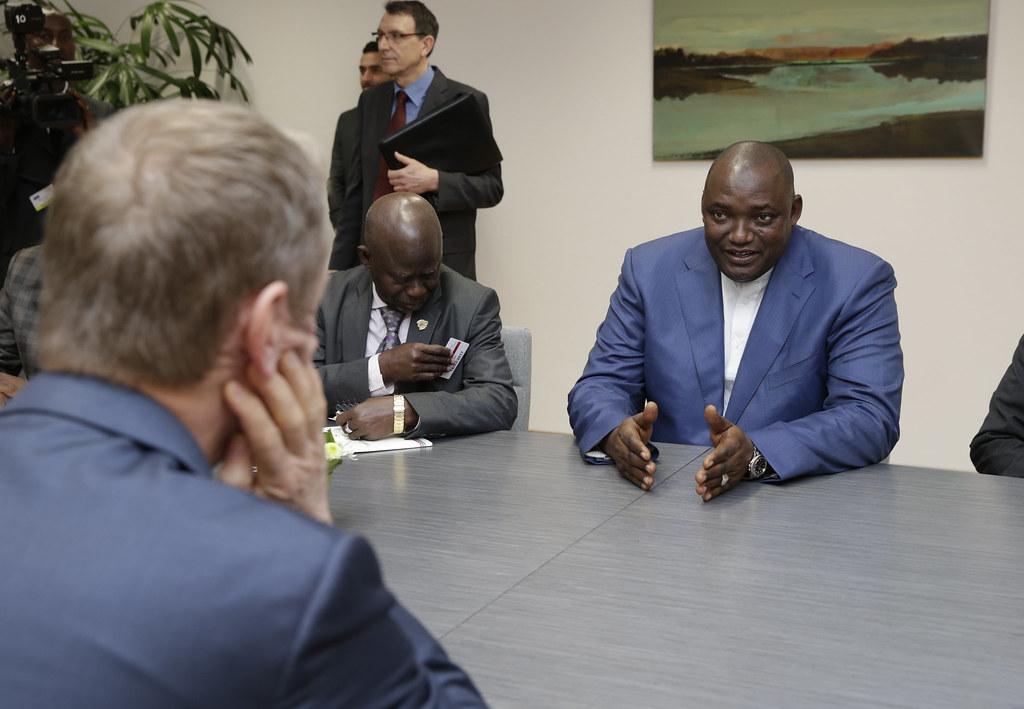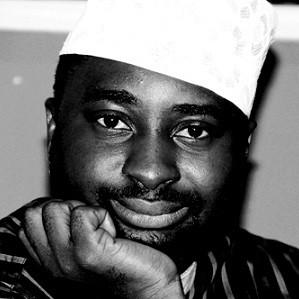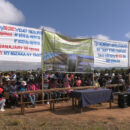Gambia: The seat-warmer, the forever runner-up, and the return of Jammeh

Five years ago, Barrow historically defeated Jammeh at the ballot box. Now he’s allying with the former dictator’s party as he bids for a second term.

Could President Adama Barrow secure a second term in The Gambia elections? Credit: European Council President.
For almost the entirety of Yahya Jammeh’s 22-year rule in The Gambia, Ousainou Darboe was a thorn in the president’s side. The opposition leader and founder of the United Democratic Party (UDP) was a rare critical voice and contested the presidency in 1996, 2001, 2006 and 2011.
It was only when Darboe was detained in April 2016 for participating in street protests that a new figure was selected to lead the UDP-led coalition into elections that December. Adama Barrow’s sole previous political experience had consisted of losing a parliamentary election nine years earlier, but he managed to defeat Jammeh at the ballot box.
To the citizens of the tiny West African state, Barrow thus personified a hopeful new era. To his political partners, he was a transitional leader, warming the seat for the immensely popular Darboe.
In the five years since Barrow took office, The Gambia has seen major political shifts. Three vice-presidents have come and gone, while a constitutional reform process has collapsed as individuals secured their grip on power. Barrow has fallen out with Darboe and exited the UDP.
This means that in the presidential election on 4 December, the incumbent will seek re-election under the banner of his freshly minted National People’s Party (NPP). Darboe, who served as a vice-president and foreign minister under Barrow, will run as the UDP candidate once again.
The election is predicted to be a close-run affair between the president and his former benefactor. The opposition UDP, which holds a parliamentary majority and has a solid grassroots representation, is confident it can engineer a second upset in six years. Despite concerns about his age, the 73-year-old Darboe is hoping to emulate fellow serial contenders like Nigeria’s Muhammadu Buhari, Ghana’s Nana Akufo-Addo, and Guinea’s Alpha Condé in securing power after several attempts.
Barrow’s bid
Barrow’s first term in office has had mixed results. He has established the Truth, Reconciliation and Reparation Commission (TRRC) to foster national healing in the aftermath of the human rights violations under Jammeh. But its findings are yet to be submitted and Essa Faal, the commission’s lead prosecutor, has resigned to run for the presidency too. This could leave the commission’s recommendations open to criticism.
Barrow’s promised security sector reforms are also still a work in progress. Throughout Jammeh’s regime, security personnel were arbitrarily sacked, replaced or promoted based on his whims or the ethnicity of the officers involved. Loyalty was prioritised over experience and competence. In the interregnum, the current administration has resorted to using troops deployed by the Economic Community of West African States (ECOWAS) in 2017. According to the BTI Transformation Index’s 2020 Gambia Country Report, there have been isolated instances of both ECOWAS peacekeepers and national security forces being heavy-handed towards citizens.
For the most part, President Barrow has maintained trust in the country’s institutions. As the BTI report comments, “the democratic institutions of the Gambia are widely considered legitimate, even by those individuals or groups who might disagree with specific decisions or policies.” However, these trends were thrown into question when Barrow’s NPP announced a pact with the Alliance for Patriotic Reorientation and Construction (APRC), Jammeh’s old party. This has sparked speculation that the former ruling party could get a role in the next government and an amnesty deal for its exiled leader. Human rights groups in The Gambia have warned of a possible return of Jammeh, who stands accused of human rights violations and killing political opponents.
Hamid Adiamoh, editor-in-Chief of NewDay newspaper, warns of what this could mean for Gambian politics. “Sometimes people think that they have control over an agreement and then you shake hands with the devil and then eventually you start to realise that the devil has more power than you thought he did,” he says.
Government insiders, however, doubt the likelihood of a presidential pardon. “ [Jammeh is] alleged to have killed quite a number of West Africans and American citizens, Gambian Americans,” says a source at the presidency on condition of anonymity. “Jammeh’s going into exile five years ago was an international thing. I think it’s highly improbable that President Barrow will have as much power to grant Yahya Jammeh amnesty or to stop his prosecution.”
Electoral maths
From all indications, the polls will be free and fair, but ethnic allegiances will continue to play a role in deciding the winners. Darboe is Mandinka, an ethnicity which accounts for a third of the population. Barrow is Fula and has been accused of serving the interests of his kinsmen. Jammeh is Jola and once said he would put the Mandinkas “where even a fly can’t see them”, a statement believed to have robbed him of their support in 2016. Barrow’s marriage of convenience with the APRC, seen as the political home of the Jolas, seems to be a strategy to boost his numbers.
Five years ago, becoming president was a case of being in the right place at the right time. Barrow was a transitional candidate, explains the presidential source. “But of course, this is politics. This is power. The president believes that it is essential for him to take the next step beyond just being the transitional leader.”
For the citizens of The Gambia, the polls could spell a new lease of life for a disgraced dictator. Or it could mark a happily-ever-after story for another West African gerontocrat and the country’s first smooth political transition since its 1965 independence from the British.







STOP THE PROPAGANDA! YOU GOT SO MANY KEY DETAILS WRONG INCLUDING ESSA FAAL, WHOSE TERM ENDED BUT DID NOT RESIGN. I WILL NOT BOTHER TO CORRECT YOU, AS THIS ARTICLE WAS PLANTED INTO THE PRESS BY THE OPPOSITION AGAINST THE LEADER OF A SOVEREIGN STATE.
OUR DEAR LEADER, BARROW – IS WHAT GAMBIA NEEDS IN 2021 JUST LIKED WE NEEDED HIM IN 2016. WHILE YOU REFUSED TO HIGHLIGHT THE GREAT WORK HE HAS DONE, WHICH IS MANIFESTED BY THE RAINBOW COALITION OF ALL ETHNIC, RELIGIONS, REGIONS/STATES, POLITICAL PARTIES etc SUPPORTING HIM. UNDER HIS RULE, WE KEPT THE NATION INTACT IN PEACE AND UNITY WHILE HE HERALDED UNPRECEDENTED INFRASTRUCTURAL DEVELOPMENT NATIONWIDE INCLUDING CREATING A SECOND CITY FOR GAMBIA. HE EMPOWERED RURAL GAMBIANS, HE SUPPORTED ALL TRIBES – THERE WAS NO COUP UNDER HIS RULE (UNPRECEDENTED), THE TRIBE OF THE EXILED PRESIDENT DID NOT RISE IN ARMS AS ANTICIPATED, OUR MEDIA IS FREE, OUR DEMOCRACY IS VIBRANT, OUR STATE INSTITUTIONS ARE FULLY INDEPENDENT, AS ONE OF THE POOREST COUNTRIES IN THE WORLD HE PREVENTED THE NATION FROM SLIPPING INTO CHAOS DURING COVID19, EDUCATION IS FREE FOR ALL CHILDREN IN GAMBIA, HE GAVE A BOOST TO THE HEALTHCARE, HE BUILT A COLLEGE ETC – HE DID ALL THIS IN 5YRS, WHILE UNDER THREAT, SABOTAGE AND ATTACK LITERALLY!
HE IS A HUMBLE, SIMPLE AND GENUINE PERSON WHO SAVED OUR NATION AND KEPT IT TOGETHER AND WE ARE GRATEFUL FOR THAT.
LISTEN, HE IS NOT FROM THE ELITE, HE IS A REGULAR GAMBIA WITH NO TIES TO POWER, HE IS LIKE US, A RURAL GAMBIAN WHO EMERGED AND LED A STRONG COALITION IN 2016, AND BUILT A BIGGER ONE. TO HELP YOU UNDERSTAND HE IS LIKE AN UNDERDOG, AND EVERYONE IS FIGHTING HIM – BUT HE WILL WIN, BECAUSE WE KNOW WHAT HE IS DOING AND WHAT HE HAS DONE FOR US – HE INSPIRED 26 CANDIDATES TO RUN FOR ELECTION, THIS NEVER HAPPENED BEFORE. WHY? BECAUSE THEY CAN SEE THEMSELVES BECOMING PRESIDENT TOO. GIVE THE MAN HIS FLOWERS!
FOREIGN DIRECT INVESTMENT IS BOOMING IN GAMBIA. COVID19 AFFECTED ALL NATIONS, THERE IS HARDSHIP EVERYWHERE AND WE SHOULD NOT USE THAT TO DISCREDIT HIM.
WHAT WE GAMBIANS ARE FACING IS A TRIBALIST, OUSSAINOU DARBOE, LEADER OF THE OPPOSITION UNITED DEMOCRATIC PARTY, WAS IN HIS GOVERNMENT FOR THREE YEARS, HE SERVED AS MINISTER OF FOREIGN AFFAIRS AND VICE PRESIDENT, THROUGHOUT THAT PERIOD HE DISRESPECTED AND UNDERMINED THE PRESIDENT WHILE ADVANCING TRIBALIST SENTIMENTS ACROSS THE COUNTRY, TELLING MEMBERS OF HIS MANDINGO/MANDINKA ETHNIC GROUP, WHO COMPRISE OF 29% OF THE NATIONAL POPULATION ”BADIYA FASA’ WHICH LOOSELY MEANS SUPPORT YOUR TRIBESMAN. THIS IS WHAT HE HAS DONE FOR 25YRS, WE PLANTED TRIBAL SENTIMENTS ACROSS THE COUNTRY, CREATING FEAR IN OTHER TRIBES, THE US GOVERNMENT A DECADE AGO DESCRIBED HIM IN A REPORT AS A TRIBALIST POLITICIAN. IF THIS DARBOE WAS WHITE IN THE US OR UK OR FRANCE OR SPAIN, HE’D BE CALLED RACIST FOR ASKING WHITE PEOPLE TO VOTE FOR HIM BECAUSE HE IS WHITE, WHAT IS EXACTLY WHAT HE HAS BEEN DOING IN THE GAMBIA WHERE WE HAVE TRIBES AND NOT RACE (THEY BOTH PERSON THE SAME FUNCTION IN A GIVEN CONTEXT).
THIS MAN IS A CORRUPT MAN, HE SOLD MINISTERIAL POSITIONS MULTIPLE TIMES TO PEOPLE PROMISING THEM POSITIONS IN GOVERNMENT IF HE WINS. HE HAS DEBT TO PAY OFF AFTER 25YRS. HE IS SICK AND DYING, LITERALLY, TERMINALLY ILL WITH ASTHMA AND OTHERS, BUT HE HAS TO PAY HIS DEBTS. FOR THAT REASON, HE IS DOING WHATEVER HE CAN TO MAKE THE COUNTRY UNGOVERNABLE.
IN 2019, HE FORMED A PROTEST AGAINST THE PRESIDENT, ASKING YOUNG MEN, MOSTLY PEOPLE OF HIS TRIBE TO UNSEAT THE PRESIDENT THROUGH MASSIVE PROTESTS, IN WHAT THEY CALLED ‘3YRS JOTNA’ MEANING IT IS 3YRS AND YOU SHOULD STEP DOWN FROM OFFICE, A PROMISE THAT THE PRESIDENT WAS GOING TO HONOUR BUT HE THE VICE PRESIDENT, WHO IS A LAWYER, FORCED HIM TO WALKAWAY FROM AS
AS HE WAS VICE PRESIDENT AND ENJOYING THE PERKS. NOW HE WANTS TO GO BACK AND HE IS DOING ALL WEIRD THINGS TO BECOME PRESIDENT, HE EVEN HIRE PEOPLE WHO DO BLACK MAGIC TO HELP HIM.
NOW DARBOE IS USING THE FOREIGN PRESS FOR BAD PR, HE IS GOING AROUND TELLING IS TRIBESMEN TO BRING THE PRESIDENT DOWN WITH A SLOGAN ‘AJINDI’ — ALL OF WHICH HAS VERY VIOLENT CONNOTATIONS.
DARBOE IS A VIOLENT, TRIBALIST, UNCIVILIZED AND NARCISSISTIC SICK CORRUPT AND POWER HUNGRY PERSON. IF HE HE WINS, THE COUNTRY WILL BE ONLY SEE REVENGE FROM HIM AND NEPOTISM.
WE WANT A NATION FOR ALL OF US AND THAT IS WHY WE WANT BARROW TO WIN, SO THAT DARBOE CAN RETIRE FROM POLITICS IN 2021, AND PAVE THE WAY FOR A NEW GENERATION OF POLITICIANS TO EMERGE AND LEAD THE NATION.
REMEMBER DARBOE HAS BEEN THE LEADER OF THE SAME PARTY FOR 25YRS, TALK ABOUT DEMOCRACY AND RULE OF LAW – HE IS AN AUTOCRAT. IF JAMMEH DID NOT JAIL DABOE IN 2016 FOR HIS PROTEST (WHICH HE HAD TO DO BECAUSE PEOPLE BRAVER THAN HIM WENT OUT TO PROTEST THE BAD LAWS OF THE LAW AND GOT ARRESTED AND SOME DIED, SO HE HAD NO CHOICE TO SURROUND HIMSELF AROUND OTHER PEOPLE AND ACT LIKE HE WAS BRAVELY PROTESTING – HE WAS FORCED TO, HE DID NOT BRAVELY DO IT, PEOPLE’S PARENT’S DIED IN HIS NAME, THAT WAS THE PUSH FACTOR).
GOING BACK TO MY POINT, IF JAMMEH DID NOT ARREST DARBOE, JAMMEH WOULD BE SEEKING HIS 6TH TERM IN OFFICE TODAY, AND DARBOE WOULD BE STILLING RUNNING FOR HIS 6TH TERM, HE IS A LIKE AN ENABLER, WITHOUT HIM JAMMEH WOULD HAVE BEEN GONE YEARS AGO BECAUSE THERE WERE COALITIONS FORMED, BUT BECAUSE HE HAS HIS 29% OF MANDINKAS (HIS TRIBESMEN) WHO IS CONTROLS BY GUILTING WITH SLOGANS LIKE ‘BADIYA FASA’ LOOSELY VOTE FOR YOUR TRIBESMANS WE NEVER JOINED COALITION TALKS. UNDER BARROW, WE WERE ABLE TO SEE COALITIONS EMERGE IN 2016, AND WE SAW A BIGGER AND MORE VIBRANT ONE IN 2021, SHOWING HIS LEADERSHIP CHARACTER AS A PEACEMAKER, UNIFIER AND BUILDER. WHAT DID DARBOE DO, HE WENT AN INSULTED OTHER TRIBES ACCUSING THEM OF NOT SUPPORTING THE PRESIDENT IN 2016. BUT WHAT DOES THE PAST HAVE TO DO WITH THE PRESENT? IT HAS A LOT TO DO WITH THE PRESENT. THIS IS WHAT DARBOE HAS ALWAYS DONE, HE RAN HIS POLITICAL CAREER ON TRIBALISM. IF YOU LOOK AT THE NUMBERS, NEVER GOT ANYTHING MORE THAN 34% OF THE TOTAL VOTES IN GAMBIA, ROUGHLY ABOUT THE SIZE OF HIS TRIBESMEN. BECAUSE HE HAS FIRED THEM UP, AND TOUCHED A NERVE IN THE HEARTS OF THE MANDINKAS, THEY ARE ABLE TO RALLY BEHIND HIM. WE THE SILENT MAJORITY ARE SUPPORTING BARROW, WHO IS ALSO A MANDINKA LIKE DARBOE BUT NEVER INVOKES TRIBALISM.
WE ARE VOTING FOR BARROW BECAUSE THE ALTERNATIVE IS A TRIALIST. HIS 25YRS CAREER IN POLITICS BEARS THE HALLMARKS OF HIS THIRST FOR VIOLENCE, NEPOTISM, VENGEANCE AND POWER!
WE WILL VOTE BARROW IN 2021, AND RETIRE DARBOE, THEN VOTE BARROW OUT IN 2021 BECAUSE WE DO NOT EVER WANT TO HAVE A POLITICIAN WHO RUNS A CAMPAIGN BASED ON TRIBAL SENTIMENTS. THIS IS WHY A VICTORY BARROW IN 2021 IS MATTERS!